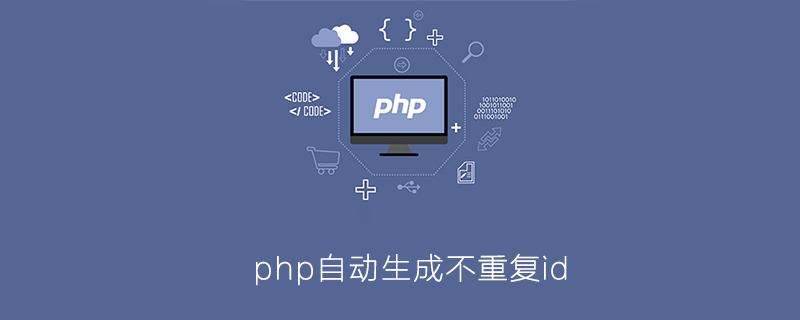php automatically generates unique ids

PHP uniqid() function can be used to generate a unique identifier that is not repeated, which is based on the current timestamp in microseconds. In cases of high concurrency or extremely short intervals (such as loop code), a large amount of duplicate data will appear. Even if the second parameter is used, it will be repeated. The best solution is to combine the md5 function to generate a unique ID.
Description
##string uniqid ([ string $prefix = "" [, bool $more_entropy = false ]] )
Parameters
prefix
more_entropy
PHP uniqid() Method 1 to generate non-duplicate unique identifiersThis method will generate a large amount of duplicate data. Running the following PHP code will result in the array index being the unique identifier generated, corresponding to The element value of is the number of times the unique identifier is repeated.
<?php
$units = array();
for($i=0;$i<1000000;$i++){
$units[] = uniqid();
}
$values = array_count_values($units);
$duplicates = [];
foreach($values as $k=>$v){
if($v>1){
$duplicates[$k]=$v;
}
}
echo '<pre class="brush:php;toolbar:false">';
print_r($duplicates);
echo '';
?>PHP uniqid() Method 2 for generating non-duplicate unique identifiersThe amount of duplicate unique identifiers generated by this method is significantly reduced.
<?php
$units = array();
for($i=0;$i<1000000;$i++){
$units[] = uniqid('',true);
}
$values = array_count_values($units);
$duplicates = [];
foreach($values as $k=>$v){
if($v>1){
$duplicates[$k]=$v;
}
}
echo '<pre class="brush:php;toolbar:false">';
print_r($duplicates);
echo '';
?>PHP uniqid() Generate unique identifier method threeThere is no duplication in the unique identifier generated by this method.
<?php
$units = array();
for($i=0;$i<1000000;$i++){
$units[]=md5(uniqid(md5(microtime(true)),true));
}
$values = array_count_values($units);
$duplicates = [];
foreach($values as $k=>$v){
if($v>1){
$duplicates[$k]=$v;
}
}
echo '<pre class="brush:php;toolbar:false">';
print_r($duplicates);
echo '';
?>PHP uniqid() generates unique identifier method fourUse the session_create_id() function to generate a unique identifier. After actual testing, it was found that even if session_create_id() is called cyclically, 100 million times, there was no duplication.
php session_create_id() is a new function in PHP 7.1. It is used to generate session id. It cannot be used in lower versions.
The above is the detailed content of php automatically generates unique ids. For more information, please follow other related articles on the PHP Chinese website!

Hot AI Tools

Undresser.AI Undress
AI-powered app for creating realistic nude photos

AI Clothes Remover
Online AI tool for removing clothes from photos.

Undress AI Tool
Undress images for free

Clothoff.io
AI clothes remover

AI Hentai Generator
Generate AI Hentai for free.

Hot Article

Hot Tools

Notepad++7.3.1
Easy-to-use and free code editor

SublimeText3 Chinese version
Chinese version, very easy to use

Zend Studio 13.0.1
Powerful PHP integrated development environment

Dreamweaver CS6
Visual web development tools

SublimeText3 Mac version
God-level code editing software (SublimeText3)

Hot Topics
 CakePHP Project Configuration
Sep 10, 2024 pm 05:25 PM
CakePHP Project Configuration
Sep 10, 2024 pm 05:25 PM
In this chapter, we will understand the Environment Variables, General Configuration, Database Configuration and Email Configuration in CakePHP.
 PHP 8.4 Installation and Upgrade guide for Ubuntu and Debian
Dec 24, 2024 pm 04:42 PM
PHP 8.4 Installation and Upgrade guide for Ubuntu and Debian
Dec 24, 2024 pm 04:42 PM
PHP 8.4 brings several new features, security improvements, and performance improvements with healthy amounts of feature deprecations and removals. This guide explains how to install PHP 8.4 or upgrade to PHP 8.4 on Ubuntu, Debian, or their derivati
 CakePHP Date and Time
Sep 10, 2024 pm 05:27 PM
CakePHP Date and Time
Sep 10, 2024 pm 05:27 PM
To work with date and time in cakephp4, we are going to make use of the available FrozenTime class.
 CakePHP File upload
Sep 10, 2024 pm 05:27 PM
CakePHP File upload
Sep 10, 2024 pm 05:27 PM
To work on file upload we are going to use the form helper. Here, is an example for file upload.
 CakePHP Routing
Sep 10, 2024 pm 05:25 PM
CakePHP Routing
Sep 10, 2024 pm 05:25 PM
In this chapter, we are going to learn the following topics related to routing ?
 Discuss CakePHP
Sep 10, 2024 pm 05:28 PM
Discuss CakePHP
Sep 10, 2024 pm 05:28 PM
CakePHP is an open-source framework for PHP. It is intended to make developing, deploying and maintaining applications much easier. CakePHP is based on a MVC-like architecture that is both powerful and easy to grasp. Models, Views, and Controllers gu
 CakePHP Creating Validators
Sep 10, 2024 pm 05:26 PM
CakePHP Creating Validators
Sep 10, 2024 pm 05:26 PM
Validator can be created by adding the following two lines in the controller.
 How To Set Up Visual Studio Code (VS Code) for PHP Development
Dec 20, 2024 am 11:31 AM
How To Set Up Visual Studio Code (VS Code) for PHP Development
Dec 20, 2024 am 11:31 AM
Visual Studio Code, also known as VS Code, is a free source code editor — or integrated development environment (IDE) — available for all major operating systems. With a large collection of extensions for many programming languages, VS Code can be c






